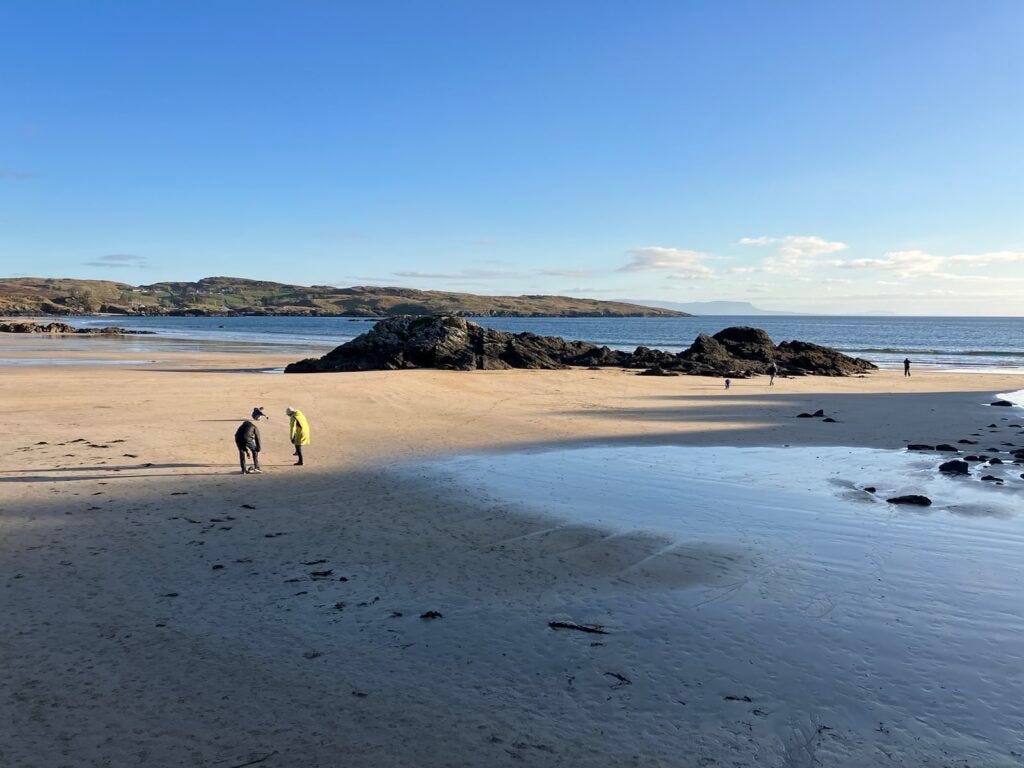Optical illusion
At first sight it looked weird: a headless figure on a lovely beach. But then, on further inspection, it turned out to be just a trick of perspective.
Quote of the Day
“In a real dark night of the soul it is always three o’clock in the morning, day after day.”
* F. Scott Fitzgerald
Musical alternative to the morning’s radio news
Steeleye Span | All Around My Hat
Long Read of the Day
The 1970s librarians who revolutionised the challenge of search
Fascinating essay in Aeon about one of the first exercises in computerised information retrieval. In the Autumn of 1970 hundreds of students and academics at Syracuse University sat one at a time before a printing computer terminal (similar to an electric typewriter) connected to an IBM 360 mainframe located across campus in New York state. Almost none of them had ever used a computer before, let alone a computer-based information retrieval system.
They were conducting their first online searches, entering carefully chosen words to find relevant psychology abstracts in a brand-new database…
It’s easy to see why librarians of the 1970s set out to revolutionise search. Work across the academy was expanding to such a degree that, soon, there would not be enough human librarians to support all of it. Yet, to get the information they needed, researchers would face a time-consuming, physically involved process that required librarian intervention. While academic researchers could browse new issues of journals in their field, for a focused search of all that had come before they still had to consult with a reference librarian to look up the correct Library of Congress subject headings within a multivolume manual. Armed with a set of subject headings, the researcher would then search across the library catalogue for books and in citation indexes for journal articles, including subscription databases such as the Science Citation Index as well as hand-built bibliographies created by their university’s subject librarians. Finally, they would physically track down the correct books and bound periodicals that included articles they thought might be relevant – if the volumes happened to be on the library shelves.
It’s no wonder that SUPARS participants found the system compelling, despite its limitations. And given how familiar university librarians were with the challenges of search, it makes sense that the system they designed bypassed subject headings and citation indexes. What’s more surprising is that, of all the online search experiments that took place during this period – including commercially focused search systems like Lockheed’s Dialog, which has since become an enterprise product – SUPARS mimicked contemporary web search more closely than any other, prefiguring several primary features of web-search protocols we rely on more than 50 years later.
Fascinating essay, and a vivid reminder of how difficult and time-intensive scholarly research was 50 years ago. I sometimes think that the modern analogy for the BC/AD chronological distinction should be BG/AG — ‘Before Google’ and ‘After Google’. Or maybe it’ll be BGPT4/AGPT4.
No moral high ground for Reddit as it seeks to capitalise on user data
Last Sunday’s Observer column:
Reddit worked reasonably well on desktop and laptop computers, but was clumsy for mobile users, which led to the development of apps which made using the site easier. The most popular of these for Apple devices is Christian Selig’s Apollo, which interacts with the Reddit site via a free API (application programming interface) provided by Reddit.
But as of 30 June, Apollo will be no more. Why? Because Steve Huffman, Reddit’s CEO, has decided that access to the API will no longer be free and Selig estimates that under the proposed new charging regime it would cost him $20m (£16m) a year to operate his app. “Going from a free API for eight years to suddenly incurring massive costs is not something I can feasibly make work with only 30 days,” he said. “That’s a lot of users to migrate, plans to create, things to test, and to get through app review, and it’s just not economically feasible. It’s much cheaper for me to simply shut down.”
Do read the whole piece.
Turn Every Page
Thanks to Declan Deasy I found a way to watch Lizzie Gottlieb’s film about the long-term relationship between the biographer Robert Caro and his editor (and Lizzie’s father), Robert Gottlieb. (The film is available on Amazon.) Caro is the author of five best-selling books: The Power Broker (1974), about urban planner Robert Moses, and four volumes of a projected five-volume biography of Lyndon Johnson), and each of these books has been edited by Gottlieb.
I enjoyed the film hugely, not least because I’m fascinated by the editorial process. I’ve been lucky to have had one great editor in my time — Toby Mundy, who is now a literary agent — and came to understand how someone can have your best interests at heart while still saying usefully critical things about your work.
The editor-writer relationship is complex and the film documents it well. As Sheila O’Malley puts it in her review,
Most editor-writer relationships don’t make headlines… But there are other famous partnerships—like Maxwell Perkins and F. Scott Fitzgerald — where the editor plays such an important role they can’t just be relegated to the background. Ezra Pound didn’t “edit” T.S. Eliot’s The Waste Land so much as he shaped it, and forcefully. You can feel Pound in that singular work. I’m sure, according to Pound, The Waste Land needed his heavy hand. But what is the editing process? There’s a mystique about it, even to those participating in it.
You can get a good impression of the film from its trailer.
My commonplace booklet
Elon Musk’s ultimate destination in full colour
It’s here, courtesy of the German Aerospace Center.





